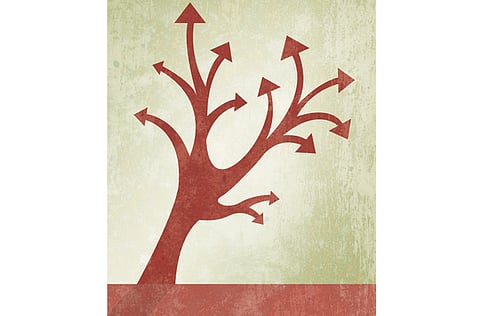Stock markets never stick with the narrative
But if asset prices do rationalise in the days ahead, prepare to buy cheap

Investors love narrative. The need for narrative is important to humans.
When early man saw the sun, he wanted an explanation. It’s understandable; the sun is a big deal. Not only did humans want an explanation, they wanted a narrative.
They didn’t stop and admit that they had no idea what the bright hot thing in the sky was, they came up with a thousand stories, all of which were wrong, which then became central to their lives.
The sun wasn’t a god and it didn’t go around the earth, yet empires rose and fell, lives were sacrificed and the sun was a core piece of belief to humans for most of history.
The narrative and explanations for the sun, though, were wildly wrong. No one until a few generations ago understood the sun was a giant nuclear reactor floating in the void of space. For 99 per cent of human existence, ideas about the sun which many relied on were completely erroneous.
This should be a lesson to investors and a warning. Narrative when it comes to markets is just as likely to be incorrect. The narrative says, when the market goes up, it has to be someone or something that is making it happen. This is not correct.
These days, if the market is falling it must be Ukraine, or Gaza or Ebola that’s driving prices lower. But it probably isn’t.
Just like the sun, the global markets are massive things. Even the biggest events cause little impact. For example, the yen/dollar was only destabilised for a little over two days by the massive catastrophe of the Japanese earthquake and tsunami of 2011.
If you look at the performance of the Dow over the last hundred years, you could be forgiven for not noticing much in the way of impact of the terrible turmoil that was the Second World War. The economic impact of the world’s populations is simply hard to shake by people or events.
That’s not to say prices are unshakeable. When stocks or commodities get too expensive they fall. It really isn’t the fault of the guy who shouted, that the avalanche swept down the mountain. It was deposition of a million tonnes of snow settled on a steep slope that was the cause. If the skier hadn’t shouted, it would have been a gust of wind or the flap of a bird’s wing that would have triggered the event.
So today or tomorrow or in the next few weeks, if the markets slump, don’t believe the headlines that some fellow or small war or bombing sent the markets into turmoil. Instead look at the state of the market, where stock prices have been rising for years as America has pumped up global money supplies at the rate of a trillion dollars a year.
That process is ending. It’s a bubble and it is about to stop being inflated.
Whether this will create a crash, a slump or merely a pause, only time will tell. But the process driving the markets around the world is the zero interest rates of the developed world. These rates are about to start rising, or at least many people think they are.
Interest rates are the core pivot point of the world economy and they are going up for the first time in seven years.
Until the world markets have got a feel for what the global economy will be like with interest rates rising, it will be very wary of risk. This isn’t likely to be good for asset values in the short term. However, the world has done just fine with 5 per cent base rates before, so after a period of uncertainty the markets will get back their poise.
If in the meantime markets crash, get ready to buy.
Whatever acute reason is handed out as the narrative, the real reason is the world economy is entering a new phase now the post credit crunch recovery is over. This uncharted phase is likely to be a prosperous one, so if we get a market slump, get ready to go shopping for cheap assets.
— The writer is the CEO of ADVFN, the financial services portal.



